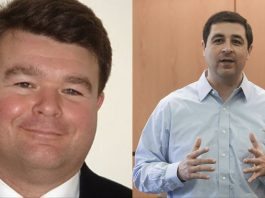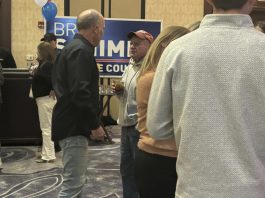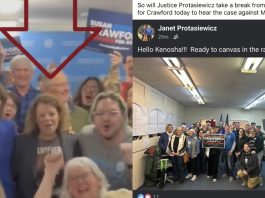The state Legislature moved the liberal-controlled state Supreme Court to reconsider its unprecedented Christmas holiday “re-do” decision throwing out already-decided legislative maps, accusing the court’s majority of pushing through the case at “record speed” to favor Democrats and fulfill a “campaign promise.”
According to the Legislature’s December 29 filing, the court’s warp-speed timeline, which the Legislature wants pushed back, will “needlessly disrupt the electoral process, prejudicing candidates, including sitting legislators, and voters. Candidates will not know until the eve of election deadlines, or perhaps later, what the redrawn districts will look like.”
“There is not enough time before the 2024 elections to fully litigate this case,” the filing states. The Republican-controlled Legislature says the court’s liberal majority has not “meaningfully considered the parties’ arguments and has instead pre-decided them in a decision written and circulated immediately after oral argument.”
The liberal justices – Janet Protasiewicz, Ann Walsh Bradley, Jill Karofky, and Rebecca Dallet – rammed the decision through right before Christmas. They threw out the Republican maps, even though the court approved them only a year ago after the US Supreme Court invalidated Gov. Tony Evers’ maps because he improperly used race to draw them.
In their Christmas decision, the liberals announced that the Republican maps were unconstitutional because they included municipal islands, even though they had recently approved Evers’ maps, which contained municipal islands. They said if Evers and the Republican legislature can’t agree on new maps yet again, they will draw them themselves, with an eye toward “partisan impact,” and on the advice of two out-of-state, unelected consultants chosen by the liberals.
The Legislature says the justices did not bother to even define “partisan impact,” and they haven’t given the Legislature enough time to be properly heard.
The court’s “opinion declared that nearly 100 years of Wisconsin redistricting plans violate the Wisconsin” Constitution after three of the same liberal justices had said a short time ago that they did not. The municipal islands are largely uninhabited pieces of annexed land, often farmland, that belong to the same municipality as the rest of the districts they are in.
According to the Legislature’s motion, “The Court never acknowledged that there are no populated noncontiguities in Milwaukee-area districts; that nearly all areas of noncontiguity affect between 0 and 20 people; and that all municipal islands could be dissolved into surrounding districts or attached to their assigned districts by moving only a ward or a few census blocks.” The liberal justices seized on the contiguity/municipal island argument because they were trying to couch their decision in the state Constitution to ward off a federal appeal.
However, the motion says the liberal justices violated the Legislature’s Fourteenth Amendment’s due process guarantee by pre-deciding the case.
“The Court’s remedial schedule denies the litigants even the most rudimentary features of civil process, and it appears to violate Wisconsin law regarding the appointment of referees or expert witnesses,” the Legislature wrote.
The Legislature noted the court is not allowing the Legislature to attempt to draw new maps first, but rather is to do so concurrently with two consultants handpicked by the liberal justices, even though the state Constitution gives the Legislature redistricting authority.
“Petitioners have obtained an injunction without offering any evidence. The Legislature has been effectively denied its constitutionally assigned redistricting power,” it adds. “The parties have been deprived of any discovery, the opportunity to cross-examine witnesses, and a hearing to resolve material factual disputes. And Petitioners’ political wish for new districts statewide will be granted in record speed.”
The filing notes that the Democratic voters who filed the lawsuit waited 474 days after the court previously ruled on the maps, calling it a “do-it-again redistricting lawsuit.”
“Despite that delay, the parties were given 10 days—half of them falling on weekends and a federal holiday—to brief the merits of Petitioners’ claims,” the motion says.
“And now, announced the Friday before Christmas, the parties have been given 21 days—a third of them falling on weekends and state holidays—to submit proposed remedies, lengthy remedial briefs, and expert reports. The message is clear: The regular rules apply to Republicans. But here, Democrats get special solicitude,” the filing notes.
The filing says that “Petitioners filed this case to collect on a campaign promise that electoral districts could be redrawn to change ‘the outcome of the 2024 election.'” That’s a reference to Protasiewicz, who prejudged the case on the campaign trail, declaring the maps “rigged” after receiving $10 million from the state Democratic Party, which wants new maps.
The Legislature wrote that respondents “object to the court’s nebulous appointment ‘consultants.’ They have not been appointed pursuant to Wisconsin law as referees or court-appointed experts, and there is no legal basis for the court to order the parties pay for them….Respondents had no input on their appointment. And the Director of State Courts cannot enter into contracts with consultants when the Director holds the position unconstitutionally.”










![WATCH: Elon Musk Town Hall Rally in Green Bay [FULL Video]](https://www.wisconsinrightnow.com/wp-content/uploads/2022/04/Elon_Musk_3018710552-265x198.jpg)

